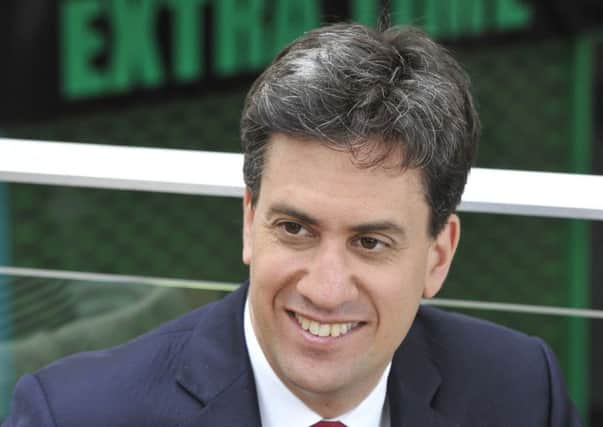Euan McColm: Ed Miliband - down but not out


He cannot, it seems clear, do a single thing right.
Eventually, though, we have to stop laughing at a photograph of a man eating a bacon sandwich and ask whether he’s had enough, whether we’ve made our point.
Surely, by now, with his preposterously bad personal ratings and inability to walk ten yards without being photographed looking like a bad mime, Miliband’s reputation is fully forged? He’s an oddball and that’s that. Everybody says so.
Advertisement
Hide AdAdvertisement
Hide AdGenerally, once a politician has so comprehensively failed to connect with voters, the game’s up. Miliband, however, stubbornly refuses to pay any heed to those in his party who are clamouring for him to go.
One very good reason for this is that, despite many of his colleagues believing that Miliband is doomed to lead Labour to failure in next year’s general election, there is no obvious would-be successor standing in the wings. Plotters and malcontents can return again and again to the suggestion that former home secretary Alan Johnson would be the perfect replacement, but while their preferred candidate continues to make clear his unwillingness to actually pitch for the job, Labour is stuck with Miliband.
And, that being so, there seems little point in him pretending that he’s anything but himself. In Miliband’s case, that’s an unusually old-fashioned left-winger.
Yesterday the Labour leader launched an attack on what he described as the “Victorian” working practices of the retail giant Sports Direct, one of many companies that uses zero-hours contracts.
Miliband’s broadside came after a speech on Thursday in which he promised to take on “vested interests” and “powerful forces” as he campaigns to win the next election.
Speaking at the University of London he said he would tackle a “zero-zero economy” where the poorest were on zero-hours contracts and the richest paid “zero tax”.
Since Tony Blair’s success in the 1997 general election, conventional wisdom has told us that the only route to electoral success is via the middle ground. There is no getting away from the fact that, after pulling Labour back from the Left, Blair went on to lead the party to three election victories. But Miliband is no Blair. And times have changed.
Blair’s strategy was a winner at a time when UK politics was dominated by Labour and the Tories. The electoral cycle was a perpetual two-horse race between left and right and, of course, it made sense to position oneself somewhere that might look attractive to those on each side of that spectrum.
Advertisement
Hide AdAdvertisement
Hide AdPolitics is no longer so simple. In the shape of Ukip south of the Border, and the SNP in Scotland, the system has two flourishing parties that appeal not only to those who believe the UK should leave the European Union or that Scotland should be independent, but to those who are generally scunnered with politics. These two parties have proved to be hugely attractive to a section of the electorate that feels the thing politics needs is to be shaken up.
In the circumstances, Miliband’s attacks on big business make perfect sense. Ukip may, in the south of England, present a threat to right-wing Tories but, in the North, Nigel Farage’s party is coming after Labour. The Ukip leader’s anti-establishment stance chimes with many Labour voters who feel they’ve been abandoned.
Miliband has, somehow, to see that his party escapes the Ukip surge while it engulfs the Tories in their traditionally safe constituencies. Pitching directly at those who feel most let down by politics, who feel most exploited, makes very good sense.
In Scotland, referendum defeat has done nothing to harm the SNP’s poll ratings. The Nationalists continue to race ahead of Labour when it comes to voting intentions for both the Westminster and Holyrood elections.
Having created a handsome lead, the SNP is explicitly pitching to traditional Labour voters. New leader Nicola Sturgeon will certainly continue along that route and, given that she is genuinely of the (centre), there is every reason to expect that she might succeed in wooing some of those who wonder whether Labour is relevant.
Miliband’s latest left-wing pitch may help Labour in Scotland, though the truth is that he will depend, for his own success, on the success of whoever wins the contest to replace Johann Lamont.
They may not be great chums, but Miliband hopes that the East Renfrewshire MP, Jim Murphy, takes control of the Scottish party. He believes that Murphy, one of the highest-profile Labour politicians in the country, can stop the SNP’s tidal wave before it washes Labour away when the country goes to the polls next May.
For a man whose demise is predicted on a daily basis, Miliband is not yet down and out. Much of what dictates his prospect of success is out of Miliband’s control.
Advertisement
Hide AdAdvertisement
Hide AdIn Scotland it will be down to the new leader to take on the SNP and – given that Lamont used her resignation to complain that Scottish Labour was treated as a “branch office” of the UK party – Miliband must be seen to let that leader do whatever he or she wishes.
In England, Miliband can only hope that Ukip causes the Tories some serious damage. He can’t play a part in ensuring that.
All Miliband can do is be himself, in all his awkward geekiness, and try to reach out to the “traditional” Labour voters who feel politics is no bloody use to them anymore.
Miliband may not look like a prime minister but in a completely changed political landscape he might yet become one. «
• Twitter: @euanmccolm